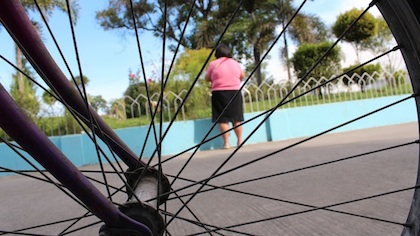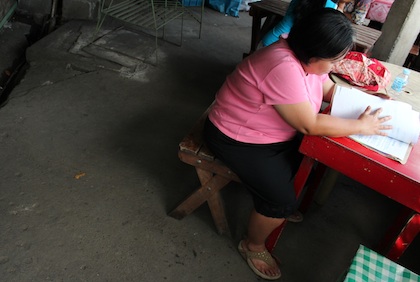SUMMARY
This is AI generated summarization, which may have errors. For context, always refer to the full article.

DAVAO CITY, Philippines – Gently brushing her cheek against her newborn like a breeze in the warmest hours of the afternoon, 20-year-old Adelyn has a lot to thank for since she became a mother.
A young single parent, Adelyn said the birth of her daughter helped her break the cycle of being a prostituted woman, an event in her life she never expected to happen.
Running away from home to escape her father’s cruelty, she moved to Cebu 3 years ago, carrying with her an ambition to live a life she wanted – free from violence and poverty.
Promised a job to become a hostess in a bar where she was instructed to go “outing” with patrons, Adelyn took the offer, thinking that “outing” would only mean going out with them for a drink.
“I experienced all the things a woman would never want to happen,” she said in Visayan.
Adelyn was only 17 years old then when she was promised a “high-paying” job. Concerned groups said she is just one of hundreds of women here who have been trafficked. Recruiters offered jobs but compelled the women to engage in sexual activities in exchange for payment.
‘Outing’
Lory Pabunag, 36, a mother of 3, said she had a horrible experience that dates all the way back to 1994.
“Someone told me that there was a restaurant looking for a waitress whose pay is good. But when I started working for them, I got surprised because we were forced to wear skimpy dress. There was no food in the restaurant – only beer and finger foods,” Lory said in Visayan.
Lory realized her employer had already “sold” her when a customer asked her for an “outing.”
“First, I thought outing was just to have fun and drinking until I realized the taxi we rode was heading to a motel,” she said.
There have been 1,099 registered prostituted women in Davao City since 2011, Carina Sajonia, Talikala advocacy officer said.
Talikala, a non-government organization that looks after the welfare of prostituted women, said 2,198 are unregistered while an estimated 4,000 women and children are also engaged in prostitution. About 20% are believed to be minors whose ages range from 12 to 17 years old.
“Don’t judge us because you don’t even know our story,” according to Lory, who said prostitution is not even a job that many people think they wanted.

Abuse
She recalled having been abused countless times by her customers. One time, she said, a police officer shoved a gun inside her genitals and started beating her, taking all of her money. Days later she had to see the doctor since her vagina got infected.
“How bitter this life is. My only hope is to raise my 3 children, buy their milk and clothes. Why do our customers treat us like we are rubbish?” she said in Visayan.
She flirted with death once, when her customer, a judo instructor, turned angry when she refused to do anal sex.
“He immersed me in a bath tub filled with warm water while I was naked. He insulted me, saying I’m no longer a virgin. Of course, I already had children. My head was already bleeding. He began striking me with his fist and foot. I thought I was going to die,” she said.
Prostitution in the Philippines remains an illegal activity and has specifically victimized women. This means that those who arrange for clients and control those prostituted are not regarded as violators of the law.
But local government units tolerate these activities by providing business permits to establishments known to house prostituted women. Prostituted women, on the other hand, are given “pink” cards, said Sajonia.
Legalize prostitution?
The United Nations, in its October 2012 report, said criminalization “increases vulnerability to HIV by fuelling stigma and discrimination” and suggested that Asian countries, including the Philippines, legalize prostitution.
The report said there is a “greater chance” of safer sex practices when prostitution is decriminalized by providing health and safety standards in the said industry.
“There is no evidence that decriminalization has increased sex work,” it said. But women’s rights organizations in the country have opposed the UN’s proposal.
“Legalization of prostitution will only legalize the abuses and exploitation within the system of prostitution,” said Jeannette Ampog, executive director of Talikala.
“Legalization of prostitution will benefit the sex industry, and the people behind it will become legitimate businessmen,” she added.
For the sons and daughters of women who used to be in prostitution, legalizing it will only mean that the government has turned its back from women looking for a way out of the illegitimate industry.
Poverty
“My mother (succumbed to prostitution because of poverty. She has not finished school. She did it for us. And there are others (who engage in prostitution) who did it simply because they were deceitfully recruited,” said 16-year-old Anna Mae.
Prostitution, according to 16-year-old Edward (not his real name), is a product of poverty. His friend Anna Mae and Louie agreed. All their mothers once engaged in prostitution.
Aspiring to become a politician someday, he said he is determined to make “better” laws that will advocate for women’s rights. He wants to do it to honor his mother.
“Our law says prostitution is a crime. And it has identified only women as the perpetrators of what it calls an illegal activity,” he said.
For the ones trapped in a job no woman would ever have dreamed of being in when they were young, Lory – who now works as a volunteer of a group of prostituted women – said the pain from their dark past is eased by the hope their children represent.
“Slowly, I’m finding a new meaning of life through my children and by loving myself,” Lory said. – Rappler.com
Add a comment
How does this make you feel?
There are no comments yet. Add your comment to start the conversation.